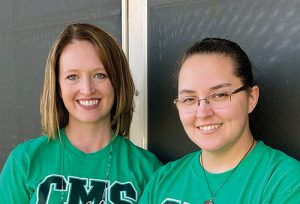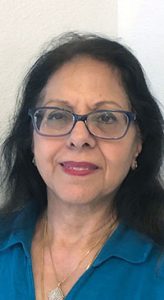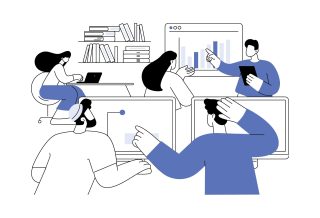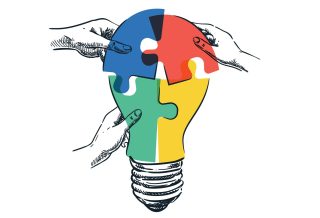FOCUS
Mentors make a difference
By Thomas Manning and Suzanne Bouffard
Categories: Career pathways, Coaching, Continuous improvement, Facilitation, Learning designs, Mentoring & induction, Teacher leadershipDecember 2020
Vol. 41, No. 6
Middle school teacher Leighann Fields remembers her earliest teaching experiences with mixed emotions. “When I was student teaching, the teacher I worked with had been at the school forever, and she knew so much. But she didn’t share it with me. I had to reinvent the wheel while I was driving down the road.”
Frequently criticized but rarely supported, Fields says she decided that she would be a different kind of teacher and a different kind of mentor if she got the chance. Now, 16 years later, Fields is getting that chance as a mentor teacher in Eunice, Louisiana.
Recognizing the need to more effectively support and retain new teachers in the state, the Louisiana Department of Education launched its nationally recognized Believe and Prepare pilot program in 2014. This program offers aspiring teachers a full year of practice under an expert mentor and a competency-based program design.
The goal is to make sure that new teachers don’t have the kind of experience Fields did, so that teachers — and, most importantly, their students — can succeed from year one.
In 2016, the Louisiana Department of Education selected Learning Forward to design and facilitate a mentor teacher training program that provided expert teachers across the state with tools and skills to more effectively support teachers in their systems through their first three years of teaching. This three-year partnership was completed in February 2020, with more than 1,600 mentor teachers participating.
 Fields and other participating mentors were nominated by their school systems based on a track record of proven success with student learning, a working knowledge of curricular tools and resources, strong communication and time management skills, an interest and ability to lead others and help them grow, and a commitment to lifelong learning.
Fields and other participating mentors were nominated by their school systems based on a track record of proven success with student learning, a working knowledge of curricular tools and resources, strong communication and time management skills, an interest and ability to lead others and help them grow, and a commitment to lifelong learning.
Before the program started, Fields says that she “was always the go-to person for mentoring, but it was just about the routines and procedures of the school. I wasn’t allowed to observe in classrooms and observe or talk about curriculum. It wasn’t anything as detailed as what I do now” that she has participated in the mentor program.
Brittany LeBlanc began working with Fields in her second year of teaching. In her first year, when she taught at a different school, she didn’t have a mentor, just informal conversations with “the teacher who had been there the longest.”
The relationship with Fields has been a game-changer for her. “Sometimes I don’t realize I’m missing certain things, and Mrs. Fields will pop in and give me feedback that I didn’t even know I needed,” she says.
The two have built a trusting, lasting relationship that LeBlanc says she relies on. “You never know when you’re going to have a question or need your mentor,” LeBlanc says.
Developing intentional mentoring strategies
Participating mentors completed extensive professional learning and a series of assessments, designed by project partner Bloomboard, leading to an official Mentor Teacher designation from the state.
Learning Forward designed a nine-day professional learning program and corresponding materials to build teachers’ knowledge and skills that they could practice immediately in their schools and with mentees. Learning Forward facilitators also provided both whole-group and individual support for mentor participants on their assessment series during and between in-person sessions.
Mentoring content was developed for cohorts comprised of elementary teachers, secondary English language arts teachers, secondary math teachers, and secondary “universal” mentors. Programs included subject-area learning customized for the mentor’s content area and grade level, designed by project partners the Dana Center at the University of Texas and Schoolkit. The program was aligned to the Louisiana Teacher Preparation Competencies as well as the Standards for Professional Learning.
The focus of the mentor training program reflected the three core areas of effective mentoring: diagnosing teacher needs, developing coaching skills to meet those needs and improve mentees’ planning and teaching skills, and measuring progress.
Within this framework, known as the mentoring cycle, each participating mentor gained essential knowledge and skills in how to build strong relationships with mentees, diagnose and prioritize mentees’ strengths and areas for growth based on data and performance expectations, design and implement a coaching support plan, assess and deepen mentor content knowledge and content-specific pedagogy, and track progress over time.
Fields appreciated the emphasis on the coaching, explaining that she learned how to “find the problem, diagnose it, figure out what you can do to fix it, implement it, and come back to reflect.” Although she had done some of those steps previously, she says she had never really thought about the stages explicitly before.
That kind of intentionality was a major goal of the training, according to Santosh Chawla, one of the Learning Forward facilitators. “We focused on why we were doing particular strategies,” she says, in order to build meta-cognition. “Meta-cognition comes in a lot during coaching conversations. The coach is supposed to lead you to your own solutions.” The goal is to empower the learner, she explains, and that takes intentionality and reflection.

Fields believes she has honed those skills as a result of the training. She remembers that during one session, “[the facilitators] had us write down the rules and procedures we go through on a daily basis. Having to stop and think about this made me so aware of the things I usually do unconsciously. Those are things beginning teachers need to know, and we [veteran teachers] need to be able to explain to them. We don’t think about those things anymore, but we need to become aware and explain why I do it this way and why it works. You can’t tell a new teacher, ‘I don’t know why I do it, I just do it.’ ”
Deepening curricular knowledge
The mentor program emphasized that mentor teachers must be experts in their own (and their mentees’) content areas. This was woven into the mentoring cycle, beginning with setting short- and long-term growth goals based on teacher competencies and student results.
Then mentors created a logical sequence of coaching supports to develop mentee skill over time to reach the identified goals and identify and leverage high-quality, evidence-based resources to support mentee-specific needs.
The learning drew on research on high-quality instructional practices and was closely aligned with state standards and curriculum. Fields says, “We really dove into curriculum and looked at the coherence map a lot. I had never heard of that before, and now I use it almost daily.” She adds that she “definitely came to understand the curriculum more.”
Chawla says that the facilitators also aimed to build teachers’ instructional strategies for content. For example, they aimed to help teachers shift from a traditional lecture or sage-on-the-stage mode to an experiential mode, using interactive strategies that she says teachers tend to use less often than they should.
One of these techniques is scaffolding instruction to build student understanding. “We gave teachers a very difficult science text that they weren’t familiar with,” Chawla says. “We wanted to make it uncomfortable so that they could see what kids experience every day in the classroom. It was a very telling moment for the teachers. They were able to see how important it is to scaffold instruction.”
Chawla, whose expertise is in teaching literacy, also help teachers outside of English language arts classes embed the teaching of reading into their subjects — something many of them had never been trained to do. Teachers learned how to find relevant and grade-based leveled reading assignments and other ways to scaffold students’ reading development.
Benefits for mentors and mentees
Results from the program showed that over all cohorts from 2017 to 2020, 95% of participating mentors reported feeling “prepared and confident to mentor resident and novice teachers.” Mentors indicated seeing improvements in student performance, their mentoring capacity, and their own instructional practices as a result of applying and sharing what they learned in the mentor teacher program. (See more results from the evaluation in this issue’s At a Glance feature on p. 68.)
Mentors used several strategies from the mentor professional learning sessions, both with their mentees and in their own classrooms, particularly in the areas of supporting new teachers in setting goals for their instruction and professional learning, developing partnership agreements with mentees, diagnosing management and instruction needs so that student learning can be achieved, and classroom management techniques.
Facilitators and participants also reported benefits that are harder to quantify but easy to recognize. Brittany LeBlanc says Fields has taught her to feel more comfortable asking questions, even though she tends to be independent and prefers to try things on her own first. The trust and nonevaluative nature of their mentoring relationship has been key to that progress.
“I usually have a hard time taking criticism, but with Mrs. Fields, it didn’t come off as criticism,” LeBlanc says. “She’s here to help. When she tells me where I’m a little lacking, she also tells me how she’s going to help me improve.”
Fields emphasizes this trust as a key to success. “I tell my mentees from the get-go that my room is a safe place. Whatever we discuss, it goes no further.” She adds that, “if the trust is not there, there’s no real respect and nothing will get accomplished.”
Fields, who tears up when she hears how helpful her mentoring has been for LeBlanc, finds a great sense of satisfaction in her mentoring work, even though she wishes she had more time to devote to it, along with her full teaching load, school leadership committee responsibilities, and other work.
As she strives to balance these responsibilities and further her mentoring work, she is grateful for the group of peers she developed through the training program, a cohort of 5th-grade math teachers from several schools and districts who call themselves “The High Fives.”
The cohort members share resources through a Google drive and text one another frequently for teaching questions and personal support. “We really bonded, and we’ve become a second family,” Fields says.
True to her coaching roots, Chawla also sees meta-cognitive benefits to the training. “In both content and coaching, the participants have become learners,” she says. “They know how important it is to be a learner and how to get there.”


Suzanne Bouffard is senior vice president of communications and publications at Learning Forward. She is the editor of The Learning Professional, Learning Forward’s flagship publication. She also contributes to the Learning Forward blog and webinars. With a background in child development, she has a passion for making research and best practices accessible to educators, policymakers, and families. She has written for many national publications including The New York Times and the Atlantic, and previously worked as a writer and researcher at the Harvard Graduate School of Education. She has a Ph.D. in developmental psychology from Duke University and a B.A. from Wesleyan University. She loves working with authors to help them develop their ideas and voices for publication.
Categories: Career pathways, Coaching, Continuous improvement, Facilitation, Learning designs, Mentoring & induction, Teacher leadership
Recent Issues
LEARNING DESIGNS
February 2025
How we learn influences what we learn. This issue shares essential...
BUILDING BRIDGES
December 2024
Students benefit when educators bridge the continuum of professional...
CURRICULUM-BASED PROFESSIONAL LEARNING
October 2024
High-quality curriculum requires skilled educators to put it into...
LEARNING TO PIVOT
August 2024
Sometimes new information and situations call for major change. This issue...












